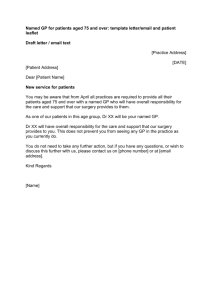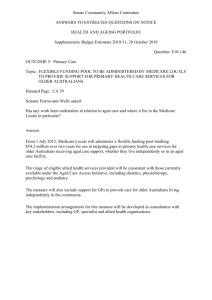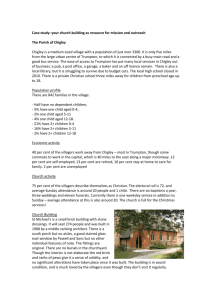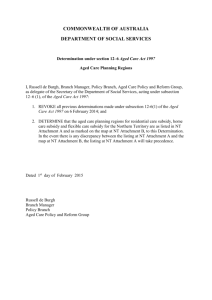Budget 2014-15 Fact Sheet
advertisement
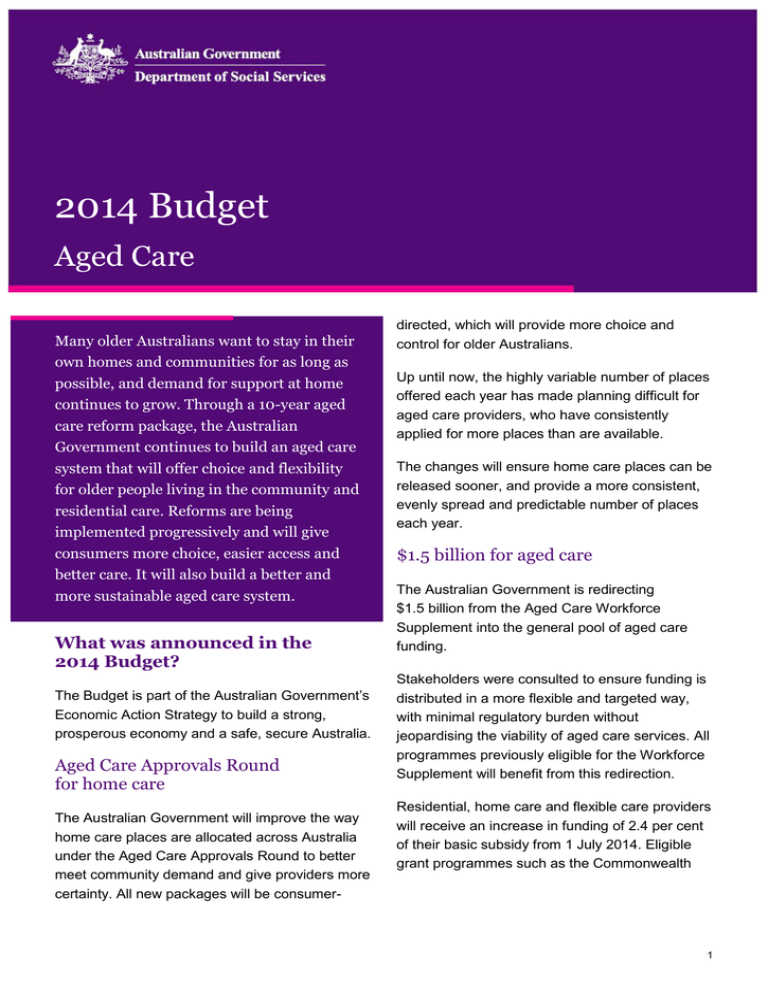
2014 Budget Aged Care Many older Australians want to stay in their own homes and communities for as long as possible, and demand for support at home continues to grow. Through a 10-year aged care reform package, the Australian Government continues to build an aged care system that will offer choice and flexibility for older people living in the community and residential care. Reforms are being implemented progressively and will give consumers more choice, easier access and better care. It will also build a better and more sustainable aged care system. What was announced in the 2014 Budget? The Budget is part of the Australian Government’s Economic Action Strategy to build a strong, prosperous economy and a safe, secure Australia. Aged Care Approvals Round for home care The Australian Government will improve the way home care places are allocated across Australia under the Aged Care Approvals Round to better meet community demand and give providers more certainty. All new packages will be consumer- directed, which will provide more choice and control for older Australians. Up until now, the highly variable number of places offered each year has made planning difficult for aged care providers, who have consistently applied for more places than are available. The changes will ensure home care places can be released sooner, and provide a more consistent, evenly spread and predictable number of places each year. $1.5 billion for aged care The Australian Government is redirecting $1.5 billion from the Aged Care Workforce Supplement into the general pool of aged care funding. Stakeholders were consulted to ensure funding is distributed in a more flexible and targeted way, with minimal regulatory burden without jeopardising the viability of aged care services. All programmes previously eligible for the Workforce Supplement will benefit from this redirection. Residential, home care and flexible care providers will receive an increase in funding of 2.4 per cent of their basic subsidy from 1 July 2014. Eligible grant programmes such as the Commonwealth 1 Home and Community Care Programme will also receive a 2.4 per cent increase in their funding. Workforce Supplement will increase by 2.4 per cent from 1 July 2014. As part of this, more money will be delivered to eligible regional, rural and remote providers through a 20 per cent increase to the Viability Supplement payments from 1 July 2014. Regional, rural and remote aged care providers will receive an additional $54 million over the next four years from a 20 per cent increase in the Viability Supplement. Other measures Reducing the annual growth rate for the Commonwealth Home Support Programme from 2018-19 will not affect current funding to providers and save the Budget $1.7 billion over the next 10 years. Discontinuing the Payroll Tax Supplement paid to some residential care providers will remove an indirect transfer payment from the Commonwealth to states, saving the Budget around $653 million over the next four years. Other measures announced in the 2014 Budget include: Reducing the annual growth rate in the Commonwealth Home Support Programme from 2018-19 to 3.5 per cent above indexation, to align with the growth in Australia’s ageing population. No individual person or provider will have their current funding cut as a result of this proposal and growth funding will continue to be allocated. The Payroll Tax Supplement paid to some residential aged care providers will be discontinued from 1 January 2015. However, the $1.5 billion being directed into the general funding pool, red tape reduction plan and reforms to the aged care system will deliver benefits that will help providers run their businesses more efficiently and make the most of their funding. More information For more information about this measure and other Department of Social Services’ Budget measures, go to www.dss.gov.au For information about the 2014 Budget, go to www.budget.gov.au Key facts Through the next Aged Care Approvals Round, about 6,000 home care places will be released in 2014–15, increasing to 12,000 by 2018-19. By 2017-18, the number of home care places will increase from around 60,000 today to more than 100,000 places. Care subsidies and grant funding for programmes previously eligible for the 2
